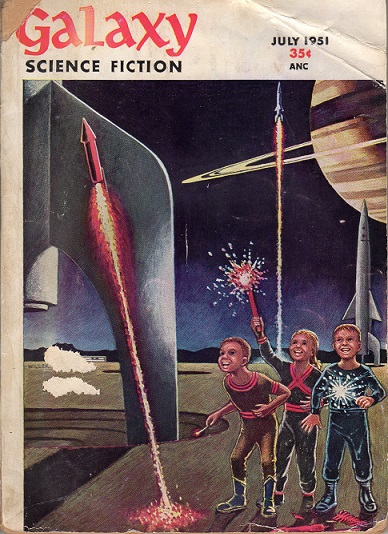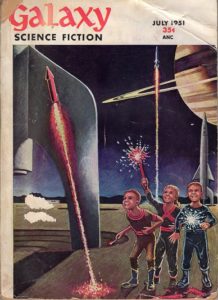Magazine Review: Galaxy Science Fiction July 1951 edited by H.L. Gold
Galaxy lasted from 1950 to 1980 as a digest-sized science fiction magazine. Originally published by an Italian firm trying to break into the American market, the magazine was noted for its emphasis on stories about social issues and its comparatively sedate covers. (“Fourth of July on Titan” is by Willer.) Editor H.L. Gold offered up to three times the usual pay per word, allowing him to get first crack at superior work by noted authors.
“Getting Personal” is the opening editorial by H.L. Gold himself; it proposes a uniform for writers so they can be easily spotted and honored/shunned. This is in contrast to the potted bios of the authors appearing in the issue, which are widely varied. Mildly amusing.
“Venus is a Man’s World” by William Tenn takes place after the mass die-off of male humans in the Third Atomic War convinced women enough was enough already, and they voted themselves in charge. The lack of a Fourth Atomic War seems to have shown the wisdom of this approach.
However, women on Earth still vastly outnumber men, and the remaining terrestrial males aren’t much to write home about. Thus it is that young Ferdinand Sparling is hauled along with his adult sister Evelyn on a ship to Venus. That frontier world is heavily tilted in the opposite direction, with lots of virile, untamed men and few women. A great place to find a husband, right?
Ferdinand (who swiftly adopts the nickname “Ford”) is exploring the ship when he discovers a stowaway, Venusian rouster Alberta “Butt” Lee Brown. Butt had come to Earth to look for a wife, but fell foul of the law and had to escape.
The story ends about as you’d expect it to in the 1950s, with the wily men outfoxing the officious women. The stereotypes are so thick that it may circle around to be funny again for some readers.
“Common Denominator” by John D. Macdonald (perhaps best known for his Travis McGee crime novels) is a chiller involving first contact with an alien species. The Argonauts seem friendly and peaceful, and in a major twist, they actually are. They’ve licked the problems of violent crime and war and have eight thousand years of peace and quiet to show for it. One Earthman, chief of the Bureau of Racial Maturity (“wait, we have one of those?”), decides he should find out how they did that. He does. Warning for suicide. My pick for the best story in the issue.
“Syndrome Johnny” by Charles Dye takes place after two successive epidemics of previously unknown diseases have ravaged humanity. The good news is that the much reduced population has world peace. The bad news is that the survivors have been genetically modified by the diseases. Or is that bad news? One government agent figures out that the mythical Syndrome Johnny (we’d say “Patient Zero”) is a real person, and conditions are right for a third epidemic that will wipe out human beings as we know them. The fate of humanity is left up to one scientist who is also a father.
“Mars Child” by Cyril Judd (pen name of C.M. Kornbluth and Judith Merrill) is the second half of a serial. Sun Lake is unusual among Mars colonies in that it’s not corporate-owned, but the collective property of its inhabitants. (More libertarian than Communist.) It’s financially struggling, but if they can keep things together just a few more years, Sun Lake will be self-sufficient and a viable alternative to living on the environmentally ruined Earth.
Bad news hits when a nearby pharmaceutical company owner claims that several kilograms of the highly addictive drug marcaine have gone missing from his factory. The trail leads to Sun Lake, he claims. Not only does Hugo Brenner have Mars’ top cop, Commissioner Bell, in his pocket, but he’s also the only supplier of Ox-En, a substance needed for all but the hardiest of humans to breathe on Mars. Either Sun Lake turns over the marcaine (which as far as the colonists know they don’t have) within a week, or Brenner will ruin them by one of a number of technically legal methods.
Meanwhile, Tony Hellman, Sun Lake’s sole doctor, has many other problems on his plate. Sunny, the first baby born in the colony, refuses to suckle, and isn’t keen on other feeding methods. Sunny’s mother is dealing with severe post-partum depression, and hallucinating the presence of the mythical “Brownies”, supposed natives of Mars. A woman from a nearby mining operation dies of (among other things) a botched attempt to give herself an abortion. Plus numerous other sick and injured people. Oh, and Tony is beginning to notice how attractive his nurse is.
Into all this mess comes Graham, a top-notch journalist from Earth, who wants to report the true conditions on Mars. His story could save Sun Lake–if he doesn’t decide to write a hit piece instead!
Naturally, it turns out that all the plot threads are more closely connected than anyone realized. Part of the resolution comes from psychic powers out of left field, and part from some dubious genetics. This novel was published in book form as Outpost Mars in 1952 and reprinted as Sin in Space in 1961.
“Galaxy’s Five Star Shelf” by Groff Conklin is their book review column. Despite the name, not all the books are treated as stellar. Mr. Conklin does recommend Eric Frank Russell’s Dreadful Sanctuary and Fred Hoyle’s The Nature of the Universe. (With the caveat for the latter that Mr. Hoyle is a little too certain he’s got it right this time.)
“Pen Pal” by Milton Lesser concerns Matilda Penshaws, a woman who is determined to find a husband. But she’s picky, and none of the local fellows will do. (Which is why she’s still single on the far side of thirty.) She sees a personal ad in the pen pal column from Haron Gorka, whose advertisement promises he’s something different from the usual stamp collectors and radio hams that put out such ads.
Matilda decides to steal a march on other prospects and drives to the next state to meet him in person. Except that no one in that town seems to have ever heard of Mr. Gorka. Except, as it turns out, the town librarian, who knows him well and is not impressed. Directions in hand, Matilda finally meets Haron, to discover he is both less and more than the advertisement promised. The ending is rather telegraphed, and there’s some tired “battle of the sexes” stuff.
The issue ends with Fritz Leiber’s “Appointment in Tomorrow.” It is the end of the Twentieth Century, a few years after World War Three turned Washington D.C. into green glass and did similar things to other cities across the globe. The American government has fallen under the power of the Thinkers, a group whose methods have produced scientific miracles, despite their philosophy sounding like a bunch of malarkey to anyone who has actual science training.
As you might guess, the Thinkers are charlatans ala Dianetics. But one of them is in fact a true believer, which leads him to a collision course with tragedy. This story has a particularly strong final line, and a surprisingly good female character.
“Common Denominator” can be read on Project Gutenberg here. “Appointment in Tomorrow” is likewise here. Other than those, you’ll have to track down this issue yourself.


